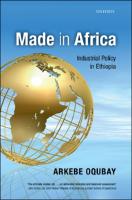Made in Africa:
Industrial Policy in Ethiopia
Abstract
This book presents the findings of original field research into the design, practice, and varied outcomes of industrial policy in three sectors in Ethiopia, covering export-oriented and import-substitution industries. The three sectors are cement, leather and leather products, and floriculture. Given that there is a single industrial strategy, why do its outcomes vary across sectors? To what extent is this a function of the specific market and political economy features of each sector? The book examines industrial structures and associated global value chains to demonstrate the challenges faced by African firms in international markets. Part of the book’s relevance is the light it throws on the whole question of industrial policy in low-income countries, the subject of renewed discussion among development economists and organizations in recent years. The findings are also discussed in the light of the history of, and the history of thought about, industrialization. Insights for researchers and policymakers emerge from the analysis of failures and successes in the three industrial sectors. The book also challenges prevailing wisdom on how much and what kind of state intervention is required to support transformational industrial policy in Africa. Among other things, the book highlights the significance for policy design of maximizing linkage effects, backward and forward, from particular industries and activities.
Keywords
development economics & emerging economies; economics of industrial organisation; political economyDOI
10.1093/acprof:oso/9780198739890.001.0001ISBN
9780198767800Publisher
Oxford University PressPublisher website
https://global.oup.com/Publication date and place
Oxford, 2015Classification
Development economics and emerging economies
Economics of industrial organization
Political economy


 Download
Download Web Shop
Web Shop